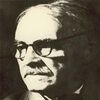
One could say that (poetry) is the shadow of life lived, a shadow hidden in spoken beauties...
Poetry is a premonition, suspicion, uncertainty and approximately...
What would poetry be? The echo of our felt and unconfessed will, the confidant of our unknown secret, the work of our tears and silent sighs, to whom is due the great discretion of the inner life.
The writer comes into the world with a contract signed with eternity.

Art either completes what nature could not complete, or imitates what she has completed.
Poet - historian: ...the duty of the poet is not to narrate things that really happened, but things that could happen within the limits of the plausible and the necessary. The historian does not differ from the poet in that one expresses himself in prose and the other in verse, but because one depicts facts that might have happened. That is why poetry is more philosophical and more chosen than history, because poetry portrays more the universal, while history more the particular.

The future of poetry is boundless, for in poetry, when it is worthy of its great destiny, our species will find, as time goes on, an ever more secure support.
The great eras of literature are so rare...because in the creation of a masterpiece two forces must compete: the force of man and the force of the moment, man not being enough if the moment is missing.
The great problem of modern poetry - a moral interpretation, from an independent point of view, of man and the world.
Poetry is nothing but man's most perfect speech, the speech in which man comes closest to being able to speak the truth.

A work that does not have its root in myth, poetry that does not participate through its depth in the essence of the universe, is but a ghost.

Poetry... a revolution in man and outside him.

Writer: ...the active consciousness of his nation, with all the practical and philosophical implications of an engaged responsibility.

The purpose of the poem; to make people able to enjoy life a little more, or endure it a little easier.
The book is a mirror: if a donkey fits in it, it cannot see the image of an apostle.
Reading means translating, and that's because no two people have the same experience. A bad reader is like a bad translator; interpret literary when they should paraphrase and paraphrase when they should interpret literary.
One of the sure signs of a book's literary value is that it can be read in a wide variety of ways.

I believe in art, which opens the doors of the world to us, which takes us away from the point and the moment, which establishes us... citizens of the cosmos.

The poet must not translate a color for us, but make us dream a color.

In principle, any valid work of art offers us an invitation to collaborate with the author, because reception is not a passive act, as the established but inappropriate term of aesthetic contemplation may suggest.
Talent is only the expressible and expressed personality, it is only the ability of a personality to translate itself into aesthetic forms, and thus, to communicate on the level of art, giving rise to characteristic formal patterns.
The poet is not a messenger of the empire, descended among men, a celestial being wandering through an alien universe, but is an exponent of the earth, striving to offer men a replica of their own existence, restructured, reduced to its essence, confronted with the world of ideal harmonies whose nostalgia devours them like a punishment without age or time.
The elevation of a poem resides in the power exerted by its structure, by the poetic relationships on which it is based, and it depends on the contrast between the highly charged reality of its elements and the degree of sensitive conversion achieved by the poet.
The poet lives in the bosom of his ultimate reality which is the human condition and does not operate with unrealities, does not carry out dreamlike transfers. All the elements of poetry are therefore provided by this inexhaustible reservoir that he never ceases to probe and express... But expression is not mirroring: poetry does not mirror realities but constitutes itself in another superimposed reality, it becomes a replica of the real , whose data he restructures by canceling them and placing them in new and unsuspected relationships; the act of revelation of these relations is what we call poetic creation.
Literature - and art in general - is also a form of knowledge, of investigating the truths of life, but it is an aesthetic knowledge.
The poet lives in history, in a given era, in a given geographical and ethnic space; he belongs to these circumscribed ambiences and expresses them, but to express, in poetry, means to operate a reduction in the direction of the essence, atemporizing the temporal, situating the restructured values, in a reversible horizon.
He who ignores national literature will never be able to rise to a true understanding of other literatures, and the passion he flaunts will only be the sad alibi of a soul infirmity.
The universal poet himself, becomes universal in his own country, and not by translation, as the naive imagine; a translation makes you lose something of what you have and can never add to you what you never had.
The true reader is always contemporary with the poet...; each time he retraces the inner space of the poem to the moment of creation itself, each time he participates in its birth inevitably attributing to it his own formula of perfection.

Any literary manifestation, aesthetic in its essence, is social, through all the contacts with different groups that prepare it, receive it, condemn it, absorb it.